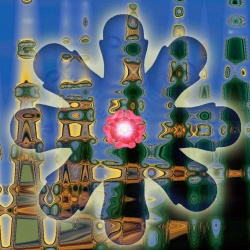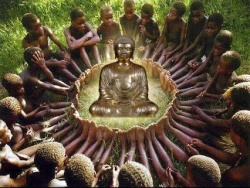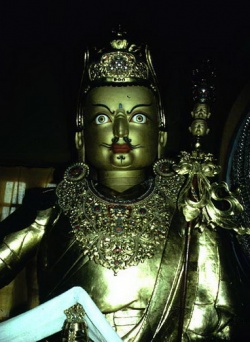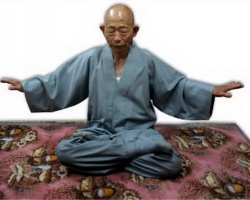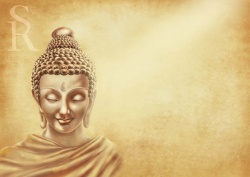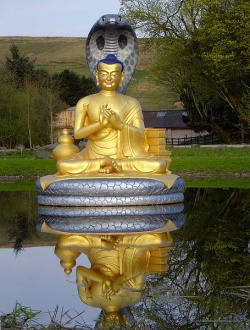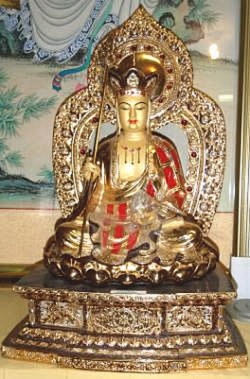Difference between revisions of "Seventy stanzas on emptiness"
m (Text replacement - "]]]" to "]])") |
|||
| (One intermediate revision by one other user not shown) | |||
| Line 7: | Line 7: | ||
[3] What is the [[reason]] for this? It is because the [[inherent]] [[existence]] of all [[phenomena]] is not to be found in [[causes]], [[conditions]], aggregations or individualities. Thus all [[phenomena]] are devoid of [[inherent]] [[existence]] and are [[empty]]. | [3] What is the [[reason]] for this? It is because the [[inherent]] [[existence]] of all [[phenomena]] is not to be found in [[causes]], [[conditions]], aggregations or individualities. Thus all [[phenomena]] are devoid of [[inherent]] [[existence]] and are [[empty]]. | ||
| − | [4] Some assert that a result already [[exists]] inherently in the [[nature]] of its [[cause]]; but then it cannot arise because it already [[exists]]. Others assert that a result [[exists]] inherently but not in the [[nature]] of its [[cause]]; so it cannot arise becuse it is not in the [[nature]] of its [[cause]]. Yet others assert that a result both does and does not [[exist]] inherently in its [[cause]]; but then they are asserting contradictory [[views]] about an [[object]] because an [[object]] cannot simultaneously both [[exist]] and not [[exist]]. Because [[phenomena]] do not arise inherently so also they do not endure or cease inherently. | + | [4] Some assert that a result already [[exists]] inherently in the [[nature]] of its [[cause]]; but then it cannot arise because it already [[exists]]. Others assert that a result [[exists]] inherently but not in the [[nature]] of its [[cause]]; so it cannot arise becuse it is not in the [[nature]] of its [[cause]]. Yet others assert that a result both does and does not [[exist]] inherently in its [[cause]]; but then they are asserting [[contradictory]] [[views]] about an [[object]] because an [[object]] cannot simultaneously both [[exist]] and not [[exist]]. Because [[phenomena]] do not arise inherently so also they do not endure or cease inherently. |
[5] Whatsoever has already arisen will not be able to arise. Whatsoever has not arisen will not arise. Either a [[phenomenon]] has already arisen or else it will arise; there is no other possibility beyond these two. Whatever is in the process of [[arising]] should have already arisen or else it will arise in the {{Wiki|future}}. | [5] Whatsoever has already arisen will not be able to arise. Whatsoever has not arisen will not arise. Either a [[phenomenon]] has already arisen or else it will arise; there is no other possibility beyond these two. Whatever is in the process of [[arising]] should have already arisen or else it will arise in the {{Wiki|future}}. | ||
| − | [6] The [[cause]] of a result which already [[exists]] is similar to that which is not a [[cause]]. Also in the case where a result does not already [[exist]], then its [[cause]] will be similar to that which is not a [[cause]]. A [[phenomenon]] should be either [[existent]] or {{Wiki|non-existent}} but cannot be both {{Wiki|non-existent}} and not-non-existent because these two are contradictory. Therefore it is not suitable to assert that there is either an inherently [[existing]] [[cause]] or an inherently [[existing]] result in the three times. | + | [6] The [[cause]] of a result which already [[exists]] is similar to that which is not a [[cause]]. Also in the case where a result does not already [[exist]], then its [[cause]] will be similar to that which is not a [[cause]]. A [[phenomenon]] should be either [[existent]] or {{Wiki|non-existent}} but cannot be both {{Wiki|non-existent}} and not-non-existent because these two are [[contradictory]]. Therefore it is not suitable to assert that there is either an inherently [[existing]] [[cause]] or an inherently [[existing]] result in the three times. |
[7] Without one there cannot be many and without many it is not possible to refer to one. Therefore one and many arise dependently and such [[phenomena]] do not have the sign of [[inherent]] [[existence]]. | [7] Without one there cannot be many and without many it is not possible to refer to one. Therefore one and many arise dependently and such [[phenomena]] do not have the sign of [[inherent]] [[existence]]. | ||
| Line 33: | Line 33: | ||
[16] Response: When you assert that [[phenomena]] [[exist]] inherently you are asserting that they do not originate in [[dependence]] on [[causes and conditions]] and thus that [[phenomena]] actually do not [[exist]]. For if [[phenomena]] do not depend on [[causes and conditions]], then they should have {{Wiki|independent}} [[existence]] throughout the three times. Therefore there cannot be [[inherent]] [[existence]] for functional [[phenomena]] which arise from [[causes and conditions]] or non-functional [[phenomena]] which do not arise from [[causes and conditions]], and there cannot be any third mode of [[existence]] for phonemena. | [16] Response: When you assert that [[phenomena]] [[exist]] inherently you are asserting that they do not originate in [[dependence]] on [[causes and conditions]] and thus that [[phenomena]] actually do not [[exist]]. For if [[phenomena]] do not depend on [[causes and conditions]], then they should have {{Wiki|independent}} [[existence]] throughout the three times. Therefore there cannot be [[inherent]] [[existence]] for functional [[phenomena]] which arise from [[causes and conditions]] or non-functional [[phenomena]] which do not arise from [[causes and conditions]], and there cannot be any third mode of [[existence]] for phonemena. | ||
| − | [17] Opponent: If [[phenomena]] do not [[exist]] inherently, how can you use terms to refer to their own [[characteristics]] or their [[characteristics]] in [[relation]] to other [[phenomena]] or non-functional [[phenomena]]? | + | [17] Opponent: If [[phenomena]] do not [[exist]] inherently, how can you use terms to refer to their [[own]] [[characteristics]] or their [[characteristics]] in [[relation]] to other [[phenomena]] or non-functional [[phenomena]]? |
Response: Although [[phenomena]] lack [[inherent]] [[existence]], still we can use terms like own-characteristics, other-characteristics and non-functional [[phenomena]] for although these are unfindable upon analysis, still, like [[objects]] of a [[dream]] they appear to have [[existence]] to ordinary [[perception]]. So the way they [[exist]] and they way they appear are different and these [[Wikipedia:Convention (norm)|conventional]] [[existences]] are called [[distortions]] or false. | Response: Although [[phenomena]] lack [[inherent]] [[existence]], still we can use terms like own-characteristics, other-characteristics and non-functional [[phenomena]] for although these are unfindable upon analysis, still, like [[objects]] of a [[dream]] they appear to have [[existence]] to ordinary [[perception]]. So the way they [[exist]] and they way they appear are different and these [[Wikipedia:Convention (norm)|conventional]] [[existences]] are called [[distortions]] or false. | ||
| Line 40: | Line 40: | ||
[19] Response: An [[object]] cannot simultaneously arise as a functional [[phenomenon]] and cease as a non-functional [[phenomenon]]. If a non-functional [[phenomenon]] does not [[exist]] then a functional [[phenomenon]] cannot [[exist]] because an [[object]] cannot arise and endure as a functional [[phenomenon]] without depending on its [[cessation]] as a non-functional [[phenomenon]], or else it would [[exist]] at all times. If a non-functional [[phenomenon]] which is different from a functional [[phenomenon]] does not [[exist]] then it is impossible for a functional [[phenomenon]] to [[exist]]. | [19] Response: An [[object]] cannot simultaneously arise as a functional [[phenomenon]] and cease as a non-functional [[phenomenon]]. If a non-functional [[phenomenon]] does not [[exist]] then a functional [[phenomenon]] cannot [[exist]] because an [[object]] cannot arise and endure as a functional [[phenomenon]] without depending on its [[cessation]] as a non-functional [[phenomenon]], or else it would [[exist]] at all times. If a non-functional [[phenomenon]] which is different from a functional [[phenomenon]] does not [[exist]] then it is impossible for a functional [[phenomenon]] to [[exist]]. | ||
| − | [20] If there is no [[arising]] and enduring, which are functional [[phenomena]], then there can be no {{Wiki|disintegration}} or [[cessation]], which are non-functional [[phenomena]]; so the latter would be completely {{Wiki|non-existent}}. If a [[phenomenon]] were to [[exist]] inherently it must have arisen from its own [[nature]] or from some other [[nature]], but it cannot arise from its own [[nature]] and because a [[phenomenon]] cannot have a different [[nature]] than its [[cause]], so it cannot arise from some other [[nature]] which has [[inherent]] [[existence]]. Because of that, a functional [[phenomenon]] cannot [[exist]] inherently and because a functional [[phenomenon]] cannot [[exist]] inherently, so a non-functional [[phenomenon]] cannot [[exist]] inherently. | + | [20] If there is no [[arising]] and enduring, which are functional [[phenomena]], then there can be no {{Wiki|disintegration}} or [[cessation]], which are non-functional [[phenomena]]; so the [[latter]] would be completely {{Wiki|non-existent}}. If a [[phenomenon]] were to [[exist]] inherently it must have arisen from its [[own]] [[nature]] or from some other [[nature]], but it cannot arise from its [[own]] [[nature]] and because a [[phenomenon]] cannot have a different [[nature]] than its [[cause]], so it cannot arise from some other [[nature]] which has [[inherent]] [[existence]]. Because of that, a functional [[phenomenon]] cannot [[exist]] inherently and because a functional [[phenomenon]] cannot [[exist]] inherently, so a non-functional [[phenomenon]] cannot [[exist]] inherently. |
[21] If a [[phenomenon]] were to [[exist]] inherently it should be [[permanent]]. If a phenomemon were to disintegrate completely then you must accept the {{Wiki|annihilationist}} [[view]]. If a [[phenomenon]] were to [[exist]] inherently it would either [[exist]] permanently or else undergo complete {{Wiki|disintegration}}: it cannot occur in a way which is different than these two. Therefore one should not assert that a [[phenomenon]] has [[inherent]] [[existence]]. | [21] If a [[phenomenon]] were to [[exist]] inherently it should be [[permanent]]. If a phenomemon were to disintegrate completely then you must accept the {{Wiki|annihilationist}} [[view]]. If a [[phenomenon]] were to [[exist]] inherently it would either [[exist]] permanently or else undergo complete {{Wiki|disintegration}}: it cannot occur in a way which is different than these two. Therefore one should not assert that a [[phenomenon]] has [[inherent]] [[existence]]. | ||
| Line 51: | Line 51: | ||
[24] Opponent: If [[arising]] and {{Wiki|disintegration}} do not [[exist]] then [[suffering]] can not [[exist]], so what [[cessation]] will bring forth [[nirvana]]? But because [[nirvana]] can be [[attained]] that means there is [[suffering]] which has [[inherent]] [[existence]] and therefore there is [[arising]] with [[inherent]] [[existence]] and {{Wiki|disintegration}} with [[inherent]] [[existence]]. | [24] Opponent: If [[arising]] and {{Wiki|disintegration}} do not [[exist]] then [[suffering]] can not [[exist]], so what [[cessation]] will bring forth [[nirvana]]? But because [[nirvana]] can be [[attained]] that means there is [[suffering]] which has [[inherent]] [[existence]] and therefore there is [[arising]] with [[inherent]] [[existence]] and {{Wiki|disintegration}} with [[inherent]] [[existence]]. | ||
| − | Response: [[Nirvana]] refers to that state where [[suffering]] does not arise with [[inherent]] [[existence]] and does not cease with [[inherent]] [[existence]]. Don't we call that state the naturally abiding [[nirvana]]? therefore [[arising]] and {{Wiki|disintegration}} do not [[exist]] inherently. | + | Response: [[Nirvana]] refers to that [[state]] where [[suffering]] does not arise with [[inherent]] [[existence]] and does not cease with [[inherent]] [[existence]]. Don't we call that [[state]] the naturally abiding [[nirvana]]? therefore [[arising]] and {{Wiki|disintegration}} do not [[exist]] inherently. |
| − | [25] You have accepted that the [[extinction]] of the continuation of [[suffering]] is [[nirvana]], in which case you have held an {{Wiki|annihilationist}} [[view]]. And if you modify your position and assert that [[nirvana]] is a state where [[suffering]] has [[inherent]] [[existence]] and has not been [[extinguished]], then you accept [[permanent]] [[suffering]] which even includes the state of [[nirvana]], which is an {{Wiki|eternalist}} [[view]]. Therefore you cannot assert that [[nirvana]] refers to a state where [[suffering]] is a non-functional [[phenomenon]] which has been [[extinguished]] nor can you assert that [[nirvana]] refers to a state where [[suffering]] is a functional [[phenomenon]] which has not been [[extinguished]]. These two assertions about [[nirvana]] are not appropriate. Therefore [[nirvana]] refers to that state where [[suffering]] does not arise with [[inherent]] [[existence]] and does not cease with [[inherent]] [[existence]]. | + | [25] You have accepted that the [[extinction]] of the continuation of [[suffering]] is [[nirvana]], in which case you have held an {{Wiki|annihilationist}} [[view]]. And if you modify your position and assert that [[nirvana]] is a [[state]] where [[suffering]] has [[inherent]] [[existence]] and has not been [[extinguished]], then you accept [[permanent]] [[suffering]] which even includes the [[state]] of [[nirvana]], which is an {{Wiki|eternalist}} [[view]]. Therefore you cannot assert that [[nirvana]] refers to a [[state]] where [[suffering]] is a non-functional [[phenomenon]] which has been [[extinguished]] nor can you assert that [[nirvana]] refers to a [[state]] where [[suffering]] is a functional [[phenomenon]] which has not been [[extinguished]]. These two assertions about [[nirvana]] are not appropriate. Therefore [[nirvana]] refers to that [[state]] where [[suffering]] does not arise with [[inherent]] [[existence]] and does not cease with [[inherent]] [[existence]]. |
[26] If you assert a [[cessation]] that is different than a functional [[phenomenon]] then you are asserting a [[cessation]] which does not depend on a functional [[phenomenon]] and which [[exists]] inherently and permanently. Because we have refuted the [[inherent]] [[existence]] of a functional [[phenomenon]] and also the [[inherent]] [[existence]] of a non-functional [[phenomenon]] which depends on a functional [[phenomenon]], so here a [[cessation]] cannot have {{Wiki|independent}} [[existence]] and so it cannot [[exist]] inherently or permanently. | [26] If you assert a [[cessation]] that is different than a functional [[phenomenon]] then you are asserting a [[cessation]] which does not depend on a functional [[phenomenon]] and which [[exists]] inherently and permanently. Because we have refuted the [[inherent]] [[existence]] of a functional [[phenomenon]] and also the [[inherent]] [[existence]] of a non-functional [[phenomenon]] which depends on a functional [[phenomenon]], so here a [[cessation]] cannot have {{Wiki|independent}} [[existence]] and so it cannot [[exist]] inherently or permanently. | ||
| Line 67: | Line 67: | ||
[31] At the point of its complete {{Wiki|disintegration}} does a [[phenomenon]] disintegrate which has already disintegrated or at that point does a [[phenomenon]] disintegrate which has not yet disintegrated? In the first case the process of {{Wiki|disintegration}} is complete, so this cannot be accepted. In the second case it is free from the [[function]] of {{Wiki|disintegration}}, so this cannot be accepted. The same applies to enduring and [[arising]]. If a [[phenomenon]] were to endure at that point when it has alrady endured then the process of enduring is complete and we cannot say that it is enduring at that point. And a [[phenomenon]] which has not endured cannot be accepted as enduring at that point because it is free from the [[function]] of enduring. If a [[phenomenon]] were to arise at the point of [[arising]] which has already arisen then the process of [[arising]] is already complete, so this cannot be accepted. and if a [[phenomenon]] were to arise at that point which has not arisen then that case is not accpetable, because it is {{Wiki|non-existent}}. | [31] At the point of its complete {{Wiki|disintegration}} does a [[phenomenon]] disintegrate which has already disintegrated or at that point does a [[phenomenon]] disintegrate which has not yet disintegrated? In the first case the process of {{Wiki|disintegration}} is complete, so this cannot be accepted. In the second case it is free from the [[function]] of {{Wiki|disintegration}}, so this cannot be accepted. The same applies to enduring and [[arising]]. If a [[phenomenon]] were to endure at that point when it has alrady endured then the process of enduring is complete and we cannot say that it is enduring at that point. And a [[phenomenon]] which has not endured cannot be accepted as enduring at that point because it is free from the [[function]] of enduring. If a [[phenomenon]] were to arise at the point of [[arising]] which has already arisen then the process of [[arising]] is already complete, so this cannot be accepted. and if a [[phenomenon]] were to arise at that point which has not arisen then that case is not accpetable, because it is {{Wiki|non-existent}}. | ||
| − | [32] If we examine composite [[phenomena]] and non-composite [[phenomena]] then we cannot find them as one, because then we cannot differentiate between these two types of [[phenomena]], and we cannot find them as many, because then these two would be completely unrelated. If a composite [[phenomenon]] is asserted to [[exist]], then it cannot arise because it is already [[existent]] and if it is asserted not to [[exist]], then it cannot arise because it is {{Wiki|non-existent}}. If it is asserted to be both [[existent]] and {{Wiki|non-existent}}, this is not possible because such a state is contradictory. Every different type of [[phenomenon]] is included within this criterion of non-inherent [[existence]]. | + | [32] If we examine composite [[phenomena]] and non-composite [[phenomena]] then we cannot find them as one, because then we cannot differentiate between these two types of [[phenomena]], and we cannot find them as many, because then these two would be completely unrelated. If a composite [[phenomenon]] is asserted to [[exist]], then it cannot arise because it is already [[existent]] and if it is asserted not to [[exist]], then it cannot arise because it is {{Wiki|non-existent}}. If it is asserted to be both [[existent]] and {{Wiki|non-existent}}, this is not possible because such a [[state]] is [[contradictory]]. Every different type of [[phenomenon]] is included within this criterion of [[non-inherent]] [[existence]]. |
[33] Opponent: The Peerless Subduer has [[taught]] that there is continuity in the flow of [[actions]]. Likewise, he has [[taught]] about the [[nature]] of [[actions]] and their results. He has also [[taught]] that the results of [[actions]] performed by an {{Wiki|individual}} [[sentient being]] must be [[experienced]] by him and that whatever [[actions]] are performed are certain to bear fruit. For these four [[reasons]] [[actions]] have [[inherent]] [[existence]]. | [33] Opponent: The Peerless Subduer has [[taught]] that there is continuity in the flow of [[actions]]. Likewise, he has [[taught]] about the [[nature]] of [[actions]] and their results. He has also [[taught]] that the results of [[actions]] performed by an {{Wiki|individual}} [[sentient being]] must be [[experienced]] by him and that whatever [[actions]] are performed are certain to bear fruit. For these four [[reasons]] [[actions]] have [[inherent]] [[existence]]. | ||
| Line 81: | Line 81: | ||
[38] When [[actions]] do not have [[inherent]] [[existence]] there will be no [[person]] to perform [[actions]]. Because both of them do not [[exist]], results do not [[exist]]. When there are no results there will be no [[person]] to [[experience]] those results {{Wiki|physically}} and [[mentally]]. Because of that [[reason]] that [[actions]] do not [[exist]] inherently, so all [[phenomena]] are devoid of [[inherent]] [[existence]]. | [38] When [[actions]] do not have [[inherent]] [[existence]] there will be no [[person]] to perform [[actions]]. Because both of them do not [[exist]], results do not [[exist]]. When there are no results there will be no [[person]] to [[experience]] those results {{Wiki|physically}} and [[mentally]]. Because of that [[reason]] that [[actions]] do not [[exist]] inherently, so all [[phenomena]] are devoid of [[inherent]] [[existence]]. | ||
| − | [39] If one [[understands]] how [[actions]] are devoid of [[inherent]] [[existence]], then he sees the [[suchness]] of [[actions]]. When he has seen [[suchness]] he will have eliminated [[ignorance]] and when there is no [[ignorance]] then the [[actions]] which are [[caused]] by [[ignorance]] cannot arise in him, and so the results of [[actions]] such as [[consciousness]] and so forth up to [[aging]] and [[death]] will not be [[experienced]] by him. When [[consciousness]] ceases to [[exist]] the dependent limb of [[aging]] and [[death]] cannot occur; thus he will attain the state of [[liberation]] free from [[aging]] and [[death]]. | + | [39] If one [[understands]] how [[actions]] are devoid of [[inherent]] [[existence]], then he sees the [[suchness]] of [[actions]]. When he has seen [[suchness]] he will have eliminated [[ignorance]] and when there is no [[ignorance]] then the [[actions]] which are [[caused]] by [[ignorance]] cannot arise in him, and so the results of [[actions]] such as [[consciousness]] and so forth up to [[aging]] and [[death]] will not be [[experienced]] by him. When [[consciousness]] ceases to [[exist]] the dependent limb of [[aging]] and [[death]] cannot occur; thus he will attain the [[state]] of [[liberation]] free from [[aging]] and [[death]]. |
[40] Through his [[miraculous powers]], [[Tathagata]] the Subduer emitted an [[emanation]] and that [[emanation]] emitted another [[emanation]]. As the [[emanation]] emitted by the [[Tathagata]] is devoid of [[inherent]] [[existence]], it is hardly necessary to say that the [[emanation]] emitted by the [[emanation]] is also devoid of [[inherent]] [[existence]]. | [40] Through his [[miraculous powers]], [[Tathagata]] the Subduer emitted an [[emanation]] and that [[emanation]] emitted another [[emanation]]. As the [[emanation]] emitted by the [[Tathagata]] is devoid of [[inherent]] [[existence]], it is hardly necessary to say that the [[emanation]] emitted by the [[emanation]] is also devoid of [[inherent]] [[existence]]. | ||
| Line 89: | Line 89: | ||
[42] The [[person]] who performs [[actions]] is said to be similar to the [[emanation]] emitted by the [[Tathagata]] because he is led by [[ignorance]]. And so his [[actions]] are said to be similar to the [[emanation]] emitted by the [[emanation]]. All of these are devoid of [[inherent]] [[existence]], though they do have a slight [[existence]] as mere [[imputation]] supported by terms and [[Wikipedia:concept|concepts]]. | [42] The [[person]] who performs [[actions]] is said to be similar to the [[emanation]] emitted by the [[Tathagata]] because he is led by [[ignorance]]. And so his [[actions]] are said to be similar to the [[emanation]] emitted by the [[emanation]]. All of these are devoid of [[inherent]] [[existence]], though they do have a slight [[existence]] as mere [[imputation]] supported by terms and [[Wikipedia:concept|concepts]]. | ||
| − | [43] If [[actions]] were to have the [[nature]] of [[inherent]] [[existence]], then they would be [[permanent]]. But if [[actions]] were [[permanent]] then they would not depend on a [[person]], and if there were no [[person]] to perform [[actions]], then [[actions]] would not [[exist]]. In that case, [[nirvana]], which is the state of [[cessation]] of [[delusions]] and [[actions]], could not be [[attained]]. If [[actions]] did not [[exist]] through mere terms and [[Wikipedia:concept|concepts]] then their ripening results such as [[happiness]] and [[suffering]] could not arise. | + | [43] If [[actions]] were to have the [[nature]] of [[inherent]] [[existence]], then they would be [[permanent]]. But if [[actions]] were [[permanent]] then they would not depend on a [[person]], and if there were no [[person]] to perform [[actions]], then [[actions]] would not [[exist]]. In that case, [[nirvana]], which is the [[state]] of [[cessation]] of [[delusions]] and [[actions]], could not be [[attained]]. If [[actions]] did not [[exist]] through mere terms and [[Wikipedia:concept|concepts]] then their ripening results such as [[happiness]] and [[suffering]] could not arise. |
| − | [44] Whatever is said by the [[Buddha]] has the [[two truths]] as its chief underlying [[thought]]; it is hard to understand and must be interpreted in this light. When the [[Buddha]] says "[[existence]]" his chief underlying [[thought]] is [[Wikipedia:Convention (norm)|conventional]] [[existence]]; when he says "[[non-existence]]" his chief underlying [[thought]] is non-inherent [[existence]]; when he says "existence-and-non-existence" his chief underlying [[thought]] is conventional-existence-and-non-inherent-existence as a mere [[object]] of examination. | + | [44] Whatever is said by the [[Buddha]] has the [[two truths]] as its chief underlying [[thought]]; it is hard to understand and must be interpreted in this {{Wiki|light}}. When the [[Buddha]] says "[[existence]]" his chief underlying [[thought]] is [[Wikipedia:Convention (norm)|conventional]] [[existence]]; when he says "[[non-existence]]" his chief underlying [[thought]] is [[non-inherent]] [[existence]]; when he says "existence-and-non-existence" his chief underlying [[thought]] is conventional-existence-and-non-inherent-existence as a mere [[object]] of {{Wiki|examination}}. |
[45] Neither does inherently [[existent]] [[form]], [[having the nature of]] [[elements]], arise from [[elements]] nor from itself and not even from others. Therefore, it does not [[exist]], does it? | [45] Neither does inherently [[existent]] [[form]], [[having the nature of]] [[elements]], arise from [[elements]] nor from itself and not even from others. Therefore, it does not [[exist]], does it? | ||
| Line 99: | Line 99: | ||
[47] [[Form]] is not apprehended as inherently [[existing]], so therefore the [[form]] does not [[exist]] inherently. If it is said that the [[inherent]] [[existence]] of [[form]] is understood by the [[mind]] which apprehends it, then such a [[mind]] does not [[exist]] inherently because it has arisen from [[causes and conditions]] to it cannot be used as a [[reason]] for proving the [[inherent]] [[existence]] of a [[form]]. | [47] [[Form]] is not apprehended as inherently [[existing]], so therefore the [[form]] does not [[exist]] inherently. If it is said that the [[inherent]] [[existence]] of [[form]] is understood by the [[mind]] which apprehends it, then such a [[mind]] does not [[exist]] inherently because it has arisen from [[causes and conditions]] to it cannot be used as a [[reason]] for proving the [[inherent]] [[existence]] of a [[form]]. | ||
| − | [48] If a [[mind]] apprehends a [[form]] with [[inherent]] [[existence]] then the [[mind]] will apprehend its own [[nature]]. Such a [[mind]] has arisen from [[causes and conditions]], so it is a [[dependent arising]] which lacks [[inherent]] [[existence]]. In the same way, [[form]] does not [[exist]] truly, so how can that [[mind]] apprehend a [[form]] with true [[existence]]? | + | [48] If a [[mind]] apprehends a [[form]] with [[inherent]] [[existence]] then the [[mind]] will apprehend its [[own]] [[nature]]. Such a [[mind]] has arisen from [[causes and conditions]], so it is a [[dependent arising]] which lacks [[inherent]] [[existence]]. In the same way, [[form]] does not [[exist]] truly, so how can that [[mind]] apprehend a [[form]] with true [[existence]]? |
| − | [49] The kind of [[form]], which has arisen but not ceased to [[exist]], that I have explained is not apprehended by each moment of the [[mind]] in the {{Wiki|present}}. Therefore, how can such a [[mind]] apprehend [[forms]] of the {{Wiki|past}} and also of the {{Wiki|future}}? | + | [49] The kind of [[form]], which has arisen but not ceased to [[exist]], that I have explained is not apprehended by each [[moment]] of the [[mind]] in the {{Wiki|present}}. Therefore, how can such a [[mind]] apprehend [[forms]] of the {{Wiki|past}} and also of the {{Wiki|future}}? |
[50] In all times {{Wiki|color}} and shape do not [[exist]] as two different things. If they were to [[exist]] as two different things then a [[mind]] could apprehend shape without considering {{Wiki|color}} or {{Wiki|color}} without considering shape. Because these two do not [[exist]] as two different things, so therefore there is not a [[mind]] which apprehends shape without taking {{Wiki|color}} into [[consideration]] nor {{Wiki|color}} without taking shape into [[consideration]]. In the [[world]], a [[form]] is known to be singular; if its shape and {{Wiki|color}} were to [[exist]] as two different things then the [[form]] would appear to the [[world]] as two instead of one. | [50] In all times {{Wiki|color}} and shape do not [[exist]] as two different things. If they were to [[exist]] as two different things then a [[mind]] could apprehend shape without considering {{Wiki|color}} or {{Wiki|color}} without considering shape. Because these two do not [[exist]] as two different things, so therefore there is not a [[mind]] which apprehends shape without taking {{Wiki|color}} into [[consideration]] nor {{Wiki|color}} without taking shape into [[consideration]]. In the [[world]], a [[form]] is known to be singular; if its shape and {{Wiki|color}} were to [[exist]] as two different things then the [[form]] would appear to the [[world]] as two instead of one. | ||
| Line 109: | Line 109: | ||
[52] When the [[eye]] does not see itself, how can it see [[forms]]? Therefore the [[eye]] and the [[forms]] do not have self-existence and the remaining entrances should be understood in the same way. | [52] When the [[eye]] does not see itself, how can it see [[forms]]? Therefore the [[eye]] and the [[forms]] do not have self-existence and the remaining entrances should be understood in the same way. | ||
| − | [53] The [[eye]] is devoid of its own [[self-existent]] [[nature]]. It is also devoid of the [[self-existent]] [[nature]] of another. In the same way, [[form]] is devoid of its own [[self-existent]] [[nature]] as well as that of another. And it is the same with the rest of the entrances. | + | [53] The [[eye]] is devoid of its [[own]] [[self-existent]] [[nature]]. It is also devoid of the [[self-existent]] [[nature]] of another. In the same way, [[form]] is devoid of its [[own]] [[self-existent]] [[nature]] as well as that of another. And it is the same with the rest of the entrances. |
[54] When any of the six internal entrances arises simultaneously with [[contact]], at that [[time]] the rest of the entrances will be devoid of the [[nature]] of [[contact]]. The rest of the entrances which are devoid of the [[nature]] of [[contact]] do not depend on the [[nature]] of [[contact]]. That which is not devoid of the [[nature]] of [[contact]] will not depend on that which is devoid of the [[nature]] of [[contact]]. | [54] When any of the six internal entrances arises simultaneously with [[contact]], at that [[time]] the rest of the entrances will be devoid of the [[nature]] of [[contact]]. The rest of the entrances which are devoid of the [[nature]] of [[contact]] do not depend on the [[nature]] of [[contact]]. That which is not devoid of the [[nature]] of [[contact]] will not depend on that which is devoid of the [[nature]] of [[contact]]. | ||
| Line 125: | Line 125: | ||
[60] A [[pleasing]] [[object]] does not [[exist]] inherently because some persons develop [[attachment]] towards it, others develop [[hatred]] towards it, and still others develop close-mindedness towards it. Therefore such qualities of the [[object]] are merely created by preconceptions, and these preconceptions also do not [[exist]] inherently because they develop from superimposition. | [60] A [[pleasing]] [[object]] does not [[exist]] inherently because some persons develop [[attachment]] towards it, others develop [[hatred]] towards it, and still others develop close-mindedness towards it. Therefore such qualities of the [[object]] are merely created by preconceptions, and these preconceptions also do not [[exist]] inherently because they develop from superimposition. | ||
| − | [61] Whatever may be an [[object]] of examination does not [[exist]] inherently. As the [[object]] of examination does not [[exist]] inherently, how can the thought-consciousness of that non-inherently [[existing]] [[object]] [[exist]] inherently? Therefore, because the [[object]] of examination and the thought-consciousness arise from [[causes and conditions]], they are [[empty of inherent existence]]. | + | [61] Whatever may be an [[object]] of {{Wiki|examination}} does not [[exist]] inherently. As the [[object]] of {{Wiki|examination}} does not [[exist]] inherently, how can the thought-consciousness of that non-inherently [[existing]] [[object]] [[exist]] inherently? Therefore, because the [[object]] of {{Wiki|examination}} and the thought-consciousness arise from [[causes and conditions]], they are [[empty of inherent existence]]. |
[62] The [[mind]] which directly [[understands]] [[emptiness]] is an unmistaken [[mind]] which eliminates the [[ignorance]] that arises from the four [[evil]] preconceptions. Without that [[ignorance]] the [[karmic formations]] will not arise, and so neither will the remaining limbs. | [62] The [[mind]] which directly [[understands]] [[emptiness]] is an unmistaken [[mind]] which eliminates the [[ignorance]] that arises from the four [[evil]] preconceptions. Without that [[ignorance]] the [[karmic formations]] will not arise, and so neither will the remaining limbs. | ||
| Line 133: | Line 133: | ||
[64] The [[Teacher]], [[Buddha]], said that the {{Wiki|conception}} of true [[existence]] of functional things which arise from [[causes and conditions]] is [[ignorance]]. From this [[ignorance]] arise the twelve dependent limbs. | [64] The [[Teacher]], [[Buddha]], said that the {{Wiki|conception}} of true [[existence]] of functional things which arise from [[causes and conditions]] is [[ignorance]]. From this [[ignorance]] arise the twelve dependent limbs. | ||
| − | [65] [[Understanding]] the non-inherent [[existence]] of things means [[seeing]] the [[reality]] [i.e., [[emptiness]] | + | [65] [[Understanding]] the [[non-inherent]] [[existence]] of things means [[seeing]] the [[reality]] [i.e., [[emptiness]]) which eliminates [[ignorance]] about the [[reality]] of things. This brings about the [[cessation]] of ignorantly [[grasping]] at an apparently true [[existence]]. From that the twelve limbs of [[dependent origination]] cease. |
| − | [66] Produced [[phenomena]] are similar to a village of [[gandharvas]], an [[illusion]], a [[hair]] net in the [[eyes]], foam, a bubble, an [[emanation]], a [[dream]], and a circle of light produced by a whirling firebrand. | + | [66] Produced [[phenomena]] are similar to a village of [[gandharvas]], an [[illusion]], a [[hair]] net in the [[eyes]], foam, a bubble, an [[emanation]], a [[dream]], and a circle of {{Wiki|light}} produced by a whirling firebrand. |
[67] There is nothing which [[exists]] inherently. In that fashion even non-functional things do not [[exist]]. Therefore, functional things which arise from [[causes and conditions]] as well as non-functional things are [[empty of inherent existence]]. | [67] There is nothing which [[exists]] inherently. In that fashion even non-functional things do not [[exist]]. Therefore, functional things which arise from [[causes and conditions]] as well as non-functional things are [[empty of inherent existence]]. | ||
| Line 141: | Line 141: | ||
[68] Because all things are [[empty of inherent existence]] the Peerless [[Tathagata]] has shown the [[emptiness]] of [[inherent]] [[existence]] of [[dependent arising]] as the [[reality of all things]]. | [68] Because all things are [[empty of inherent existence]] the Peerless [[Tathagata]] has shown the [[emptiness]] of [[inherent]] [[existence]] of [[dependent arising]] as the [[reality of all things]]. | ||
| − | [69] [[Ultimate reality]] is contained within the limit of the non-inherent [[existence]] of a thing. For that [[reason]], the Accomplished [[Buddha]], the Subduer, has [[imputed]] various terms in the [[manner]] of the [[world]] through comparison. | + | [69] [[Ultimate reality]] is contained within the limit of the [[non-inherent]] [[existence]] of a thing. For that [[reason]], the Accomplished [[Buddha]], the Subduer, has [[imputed]] various terms in the [[manner]] of the [[world]] through comparison. |
[70] What is shown {{Wiki|conventionally}} to the [[world]] appears to be without {{Wiki|disintegration}}, but the [[Buddha]] has never actually shown anything with true [[existence]]. Those who do not understand what is explained by the [[Tathagata]] to be {{Wiki|conventionally}} [[existent]] and [[empty]] of the sign of true [[existence]] are frightened by this [[teaching]]. | [70] What is shown {{Wiki|conventionally}} to the [[world]] appears to be without {{Wiki|disintegration}}, but the [[Buddha]] has never actually shown anything with true [[existence]]. Those who do not understand what is explained by the [[Tathagata]] to be {{Wiki|conventionally}} [[existent]] and [[empty]] of the sign of true [[existence]] are frightened by this [[teaching]]. | ||
| − | [71] It is known in the way of the [[world]] that "this arises in [[dependence]] on that." Such statements are not refuted. But whatsoever arises dependently does not [[exist]] inherently, and how can that non-inherent [[existence]] itself have [[inherent]] [[existence]]? In fact, that non-inherent [[existence]] must definitely not [[exist]] inherently! | + | [71] It is known in the way of the [[world]] that "this arises in [[dependence]] on that." Such statements are not refuted. But whatsoever arises dependently does not [[exist]] inherently, and how can that [[non-inherent]] [[existence]] itself have [[inherent]] [[existence]]? In fact, that [[non-inherent]] [[existence]] must definitely not [[exist]] inherently! |
| − | [72] Those who have [[faith]] in the [[teaching]] of [[emptiness]] will strive for it through a number of different kinds of {{Wiki|reasoning}}. Whatever they have understood about it in terms of non-inherent [[existence]], they clarify this for others, which helps others to attain [[nirvana]] by [[abandoning]] [[grasping]] at the apparently true [[existence]] of [[cyclic existence]] and non-cyclic [[existence]]. | + | [72] Those who have [[faith]] in the [[teaching]] of [[emptiness]] will strive for it through a number of different kinds of {{Wiki|reasoning}}. Whatever they have understood about it in terms of [[non-inherent]] [[existence]], they clarify this for others, which helps others to attain [[nirvana]] by [[abandoning]] [[grasping]] at the apparently true [[existence]] of [[cyclic existence]] and non-cyclic [[existence]]. |
[73] By [[seeing]] these internal and external [[phenomena]] [[arising]] from [[causes and conditions]] they will eliminate the whole network of [[wrong views]]. With the elimination of [[wrong views]] they will have abandoned [[attachment]], closed-mindedness and [[hatred]] and thereby attain [[nirvana]] unstained by [[wrong views]]. | [73] By [[seeing]] these internal and external [[phenomena]] [[arising]] from [[causes and conditions]] they will eliminate the whole network of [[wrong views]]. With the elimination of [[wrong views]] they will have abandoned [[attachment]], closed-mindedness and [[hatred]] and thereby attain [[nirvana]] unstained by [[wrong views]]. | ||
Latest revision as of 20:20, 4 April 2016
[1] "Arising," "enduring," and "disintegrating;" "existing" and "non-existing;" "inferior," "middling," and "superior" do not have true existence. These terms are used by the Buddha in accordance with worldy conventions.
[2] All phenomena must have either self-existence or non-self-existence. There is no phenomenon which is other than these two, nor are there any expressions which do not come under these two catagories. All phenomena which are the subject of this treatise are similar to nirvana because all phenomena are devoid of inherent existence.
[3] What is the reason for this? It is because the inherent existence of all phenomena is not to be found in causes, conditions, aggregations or individualities. Thus all phenomena are devoid of inherent existence and are empty.
[4] Some assert that a result already exists inherently in the nature of its cause; but then it cannot arise because it already exists. Others assert that a result exists inherently but not in the nature of its cause; so it cannot arise becuse it is not in the nature of its cause. Yet others assert that a result both does and does not exist inherently in its cause; but then they are asserting contradictory views about an object because an object cannot simultaneously both exist and not exist. Because phenomena do not arise inherently so also they do not endure or cease inherently.
[5] Whatsoever has already arisen will not be able to arise. Whatsoever has not arisen will not arise. Either a phenomenon has already arisen or else it will arise; there is no other possibility beyond these two. Whatever is in the process of arising should have already arisen or else it will arise in the future.
[6] The cause of a result which already exists is similar to that which is not a cause. Also in the case where a result does not already exist, then its cause will be similar to that which is not a cause. A phenomenon should be either existent or non-existent but cannot be both non-existent and not-non-existent because these two are contradictory. Therefore it is not suitable to assert that there is either an inherently existing cause or an inherently existing result in the three times.
[7] Without one there cannot be many and without many it is not possible to refer to one. Therefore one and many arise dependently and such phenomena do not have the sign of inherent existence.
[8] The twelve limbs of dependent origination result in suffering: since the twelve limbs and suffering do not arise independently of each other, they don't exist inherently. Furthermore, it is not acceptable to assert that the twelve limbs are based on a single moment of a mind nor on successive moments of mind, as such moments arise dependently and do not exist inherently.
[9] Because contaminated things arise in dependence on one another they do not exist inherently as permanent phenomena nor do they exist inherently as impermanent phenomena; neither as phenomena with self-nature nor without self-nature; neither as pure or impure; neither as blissful nor as suffering. It is thus that the four distortions do not exist as qualities which inhere in phenomena, but rather are imputed to phenomena.
[10] There are no four distortions which exist inherently and thus there can be no ignorance arising from them. Because that ignorance does not exist inherently it cannot give birth to karmic formations, which means karmic formations will not arise and so also the remaining limbs too.
[11] Ignorance cannot originate as a cause except in dependence on the karmic formations. Also, the karmic formations cannot originate except in dependence on their cause, which is ignorance. Because ignorance and karmic formations are interrelated as cause and effect so these two are known by a valid cognizer not to exist inherently.
[12] By itself none of the twelve limbs can originate inherently, but must depend on the remaining limbs. How then can one limb produce another limb? Moreover, because one limb has originated as a cause in dependence on the other limbs, so how can it act as a condition for the origination of results such as the other limbs?
[13] The father is not the son and the son is not the father. These two are mutually not non-existent and the two of them cannot arise simultaneously. It is likewise with the twelve dependent limbs.
[14] Just as in a dream, happiness and suffering depend on dream objects and upon awakening these objects are known not to actually exist, likewise any phenomenon which arises in dependence on another dependent phenomenon should be known not to exist in the manner of its appearance.
[15] Vaibhisika: If you assert that phenomena don't exist inherently then you are asserting that they don't exist at all. So how can you make distinctions like inferior, middling, and superior or that there are different beings in the six realms of existence? How then can you assert the manifestation of a result which arises from causes?
[16] Response: When you assert that phenomena exist inherently you are asserting that they do not originate in dependence on causes and conditions and thus that phenomena actually do not exist. For if phenomena do not depend on causes and conditions, then they should have independent existence throughout the three times. Therefore there cannot be inherent existence for functional phenomena which arise from causes and conditions or non-functional phenomena which do not arise from causes and conditions, and there cannot be any third mode of existence for phonemena.
[17] Opponent: If phenomena do not exist inherently, how can you use terms to refer to their own characteristics or their characteristics in relation to other phenomena or non-functional phenomena?
Response: Although phenomena lack inherent existence, still we can use terms like own-characteristics, other-characteristics and non-functional phenomena for although these are unfindable upon analysis, still, like objects of a dream they appear to have existence to ordinary perception. So the way they exist and they way they appear are different and these conventional existences are called distortions or false.
[18] Opponent: If phenomena are devoid of inherent existence then they will be completely non-existent like the horns of a rabbit, and so there can be no occurrence of their arising or their cessation. As Buddha has spoken about arising and cessation, they must exist, so how can things be devoid of inherent existence?
[19] Response: An object cannot simultaneously arise as a functional phenomenon and cease as a non-functional phenomenon. If a non-functional phenomenon does not exist then a functional phenomenon cannot exist because an object cannot arise and endure as a functional phenomenon without depending on its cessation as a non-functional phenomenon, or else it would exist at all times. If a non-functional phenomenon which is different from a functional phenomenon does not exist then it is impossible for a functional phenomenon to exist.
[20] If there is no arising and enduring, which are functional phenomena, then there can be no disintegration or cessation, which are non-functional phenomena; so the latter would be completely non-existent. If a phenomenon were to exist inherently it must have arisen from its own nature or from some other nature, but it cannot arise from its own nature and because a phenomenon cannot have a different nature than its cause, so it cannot arise from some other nature which has inherent existence. Because of that, a functional phenomenon cannot exist inherently and because a functional phenomenon cannot exist inherently, so a non-functional phenomenon cannot exist inherently.
[21] If a phenomenon were to exist inherently it should be permanent. If a phenomemon were to disintegrate completely then you must accept the annihilationist view. If a phenomenon were to exist inherently it would either exist permanently or else undergo complete disintegration: it cannot occur in a way which is different than these two. Therefore one should not assert that a phenomenon has inherent existence.
[22] Opponent: Because of continuity there is no danger of the two extreme views. Acting as a cause of another causal phenomenon the original causal phenomenon ceases to exist.
Reply: As explained before, the cause and the result, like a functional phenomenon and a non-functional phenomenon, cannot arise with inherent existence either simultaneously or sequentially. In your view their lack of inherent existence makes them completely non-existent, in which case you cannot assert their continuity or that of the moments between them. Therefore the faults of the two extremes remain in your view.
[23] Opponent: When Buddha explained the path to liberation he spoke about arising and disintegration, so they must have true existence.
Response: It is true that Buddha spoke about arising and disintegration, but they are devoid of inherent existence. For that reason the way they appear and the way they exist are dissimilar, and they appear in a deceptive way to the world.
[24] Opponent: If arising and disintegration do not exist then suffering can not exist, so what cessation will bring forth nirvana? But because nirvana can be attained that means there is suffering which has inherent existence and therefore there is arising with inherent existence and disintegration with inherent existence.
Response: Nirvana refers to that state where suffering does not arise with inherent existence and does not cease with inherent existence. Don't we call that state the naturally abiding nirvana? therefore arising and disintegration do not exist inherently.
[25] You have accepted that the extinction of the continuation of suffering is nirvana, in which case you have held an annihilationist view. And if you modify your position and assert that nirvana is a state where suffering has inherent existence and has not been extinguished, then you accept permanent suffering which even includes the state of nirvana, which is an eternalist view. Therefore you cannot assert that nirvana refers to a state where suffering is a non-functional phenomenon which has been extinguished nor can you assert that nirvana refers to a state where suffering is a functional phenomenon which has not been extinguished. These two assertions about nirvana are not appropriate. Therefore nirvana refers to that state where suffering does not arise with inherent existence and does not cease with inherent existence.
[26] If you assert a cessation that is different than a functional phenomenon then you are asserting a cessation which does not depend on a functional phenomenon and which exists inherently and permanently. Because we have refuted the inherent existence of a functional phenomenon and also the inherent existence of a non-functional phenomenon which depends on a functional phenomenon, so here a cessation cannot have independent existence and so it cannot exist inherently or permanently.
[27] Without depending on the defined one cannot establish a definition and without considering the definition one cannot establish the defined. As they depend on each other, they have not arisen by themselves, so therefore the defined and the definition are devoid of inherent existence and also they do not exist inherently in a mutually dependent way, so none of them can be used to establish the inherent existence of another one.
[28] Following the logic of this explanation of mutually dependent origination one cannot use the cause of a result to prove that the result has inherent existence. The same applies to all the pairs of such as feeling and the one who feels or seeing and the seer, and so forth. Taking these as examples one should understand how all the pairs are explained as being devoid of inherent existence because they originate in mutual dependence.
[29] Time does not exist inherently because the three periods of time do not maintain continuity by themselves, but are dependent on each other. If the three times were to have inherent existence in a mutually dependent way, then we could not make distinctions between, but because we can make distinctions so time itself cannot be established as having inherent existence. Because time does not have inherent existence, the functional basis on which the three times is imputed cannot have inherent existence, so therefore the three times do not have inherent existence and are merely imputed by concepts.
[30] Following the reasoning just given, the three characteristics of a composite phenomenon which are arising, enduring and ceasing are unfindable upon ultimate analysis even for you, so then a functional phenomenon which is characterized by these three attributes is also unfindable, in which case the functional basis of a composite phenomenon becomes unfindable. So when a composite phenomenon cannot exist inherently, how can a non-composite phenomenon which depends on a composite phenomenon have inherent existence in the least.
[31] At the point of its complete disintegration does a phenomenon disintegrate which has already disintegrated or at that point does a phenomenon disintegrate which has not yet disintegrated? In the first case the process of disintegration is complete, so this cannot be accepted. In the second case it is free from the function of disintegration, so this cannot be accepted. The same applies to enduring and arising. If a phenomenon were to endure at that point when it has alrady endured then the process of enduring is complete and we cannot say that it is enduring at that point. And a phenomenon which has not endured cannot be accepted as enduring at that point because it is free from the function of enduring. If a phenomenon were to arise at the point of arising which has already arisen then the process of arising is already complete, so this cannot be accepted. and if a phenomenon were to arise at that point which has not arisen then that case is not accpetable, because it is non-existent.
[32] If we examine composite phenomena and non-composite phenomena then we cannot find them as one, because then we cannot differentiate between these two types of phenomena, and we cannot find them as many, because then these two would be completely unrelated. If a composite phenomenon is asserted to exist, then it cannot arise because it is already existent and if it is asserted not to exist, then it cannot arise because it is non-existent. If it is asserted to be both existent and non-existent, this is not possible because such a state is contradictory. Every different type of phenomenon is included within this criterion of non-inherent existence.
[33] Opponent: The Peerless Subduer has taught that there is continuity in the flow of actions. Likewise, he has taught about the nature of actions and their results. He has also taught that the results of actions performed by an individual sentient being must be experienced by him and that whatever actions are performed are certain to bear fruit. For these four reasons actions have inherent existence.
[34] Reply: Buddha taught that actions do not exist inherently and so they cannot arise inherently. Although actions do not exist inherently, they will not be wasted but it is certain that they will bear fruit. From these actions arise consciousness, name and form, and the rest of the limbs of dependent origination. Conception of self is generated through focusing on the person who is merely imputed upon these dependent limbs. Also, it arises from the preconception which takes imporper objects and overestimates them.
[35] If actions were to have inherent existence then they would not be impermenent but would have the nature of permanance, and then the body which results from those actions would also be permanent. If actions were to be permanent then they could not give rise to suffering, which is the ripening of actions. If actions were non-changing then they would have the nature of permance and then they would have self-existence. But then Buddha would not have taught about the lack of self-nature.
[36] If actions were to exist at the time of conditions, those actions could not arise from those conditions. And if conditions do not have the potential to give rise to actions, then actions cannot arise from conditions because those conditions are similar to non-conditions. Because actions cannot arise even slightly from non-conditions, so therefore all composite phenomena are like an illusion, and a gandharva town and a mirage, and therefore they lack inherent existence.
[37] Actions are caused by delusions. Our body arises from the nature of delusions and actions. Because the cause of the body is actions, and actions arise from delusions, so therefore these three are devoid if inherent existence.
[38] When actions do not have inherent existence there will be no person to perform actions. Because both of them do not exist, results do not exist. When there are no results there will be no person to experience those results physically and mentally. Because of that reason that actions do not exist inherently, so all phenomena are devoid of inherent existence.
[39] If one understands how actions are devoid of inherent existence, then he sees the suchness of actions. When he has seen suchness he will have eliminated ignorance and when there is no ignorance then the actions which are caused by ignorance cannot arise in him, and so the results of actions such as consciousness and so forth up to aging and death will not be experienced by him. When consciousness ceases to exist the dependent limb of aging and death cannot occur; thus he will attain the state of liberation free from aging and death.
[40] Through his miraculous powers, Tathagata the Subduer emitted an emanation and that emanation emitted another emanation. As the emanation emitted by the Tathagata is devoid of inherent existence, it is hardly necessary to say that the emanation emitted by the emanation is also devoid of inherent existence.
[41] When we say that these two emanations do not exist inherently, that does not mean that they are completely non-existent but rather that both of them, just like actions and the one who performs actions, merely exist through terms because they are separated from the nature of inherent existence. They do not exist, but merely through imputation by thought in a deceptive way.
[42] The person who performs actions is said to be similar to the emanation emitted by the Tathagata because he is led by ignorance. And so his actions are said to be similar to the emanation emitted by the emanation. All of these are devoid of inherent existence, though they do have a slight existence as mere imputation supported by terms and concepts.
[43] If actions were to have the nature of inherent existence, then they would be permanent. But if actions were permanent then they would not depend on a person, and if there were no person to perform actions, then actions would not exist. In that case, nirvana, which is the state of cessation of delusions and actions, could not be attained. If actions did not exist through mere terms and concepts then their ripening results such as happiness and suffering could not arise.
[44] Whatever is said by the Buddha has the two truths as its chief underlying thought; it is hard to understand and must be interpreted in this light. When the Buddha says "existence" his chief underlying thought is conventional existence; when he says "non-existence" his chief underlying thought is non-inherent existence; when he says "existence-and-non-existence" his chief underlying thought is conventional-existence-and-non-inherent-existence as a mere object of examination.
[45] Neither does inherently existent form, having the nature of elements, arise from elements nor from itself and not even from others. Therefore, it does not exist, does it?
[46] A form cannot have the fourfold nature of the elements because if the form has four elements then it will be fourfold and the four elements cannot have a singular form or else they will become one like form, so how can form arise from the four great elements as its cause?
[47] Form is not apprehended as inherently existing, so therefore the form does not exist inherently. If it is said that the inherent existence of form is understood by the mind which apprehends it, then such a mind does not exist inherently because it has arisen from causes and conditions to it cannot be used as a reason for proving the inherent existence of a form.
[48] If a mind apprehends a form with inherent existence then the mind will apprehend its own nature. Such a mind has arisen from causes and conditions, so it is a dependent arising which lacks inherent existence. In the same way, form does not exist truly, so how can that mind apprehend a form with true existence?
[49] The kind of form, which has arisen but not ceased to exist, that I have explained is not apprehended by each moment of the mind in the present. Therefore, how can such a mind apprehend forms of the past and also of the future?
[50] In all times color and shape do not exist as two different things. If they were to exist as two different things then a mind could apprehend shape without considering color or color without considering shape. Because these two do not exist as two different things, so therefore there is not a mind which apprehends shape without taking color into consideration nor color without taking shape into consideration. In the world, a form is known to be singular; if its shape and color were to exist as two different things then the form would appear to the world as two instead of one.
[51] The eye has no consciousness because the eye is a form but eye consciousness is formless and that which is formless cannot adhere to form. In the same way the form which is observed has no eye consciousness, nor is it between eye and form. Because eye consciousness is generated in dependence on eye and form, if it is apprehended as having inherent existence, that is a mistaken concept.
[52] When the eye does not see itself, how can it see forms? Therefore the eye and the forms do not have self-existence and the remaining entrances should be understood in the same way.
[53] The eye is devoid of its own self-existent nature. It is also devoid of the self-existent nature of another. In the same way, form is devoid of its own self-existent nature as well as that of another. And it is the same with the rest of the entrances.
[54] When any of the six internal entrances arises simultaneously with contact, at that time the rest of the entrances will be devoid of the nature of contact. The rest of the entrances which are devoid of the nature of contact do not depend on the nature of contact. That which is not devoid of the nature of contact will not depend on that which is devoid of the nature of contact.
[55] The eye, eye consciousness and its object arise and immediately disintegrate, so they cannot exist as abiding in their natures and so those three cannot assemble. When these three cannot assemble, contact cannot exist and if contact cannot exist, so there cannot be feeling.
[56] Consciousness arises in dependence on internal and external entrances. Because consciousness arises in dependence on the entrances, so it is like a mirage and an illusion which are devoid of inherent existence.
[57] Consciousness cannot arise without taking its object, so it depends on the object of knowledge. The object of knowledge cannot arise without depending on the consciousness which apprehends it, and therefore because they exist in a mutually dependent way both of them lack inherent existence. The object of know ledge and the apprehension of the object do not exist inherently, therefore the person who knows the object does not exist inherently.
[58] Buddha has seen no essence in composite phenomena with inherent existence so he said that all composite phenomena are impermanent, so therefore they are devoid of inherent existence, or because he said that all composite phenomena are impermanent, so how could they exist inherently in the nature of permanent phenomena? If phenomena were to have inherent existence they should either be permanent or impermanent; but how can there be phenomena which are both permanent and impermanent at the same time?
[59] Through superimposition one develops the three distorted preconceptions toward pleasing, repulsive and neutral objects, which respectively cause attachment, hatred and closed-mindedness. Because they arise in dependence on these conditions, the essential nature of attachment, hatred and closed-mindedness is without inherent existence.
[60] A pleasing object does not exist inherently because some persons develop attachment towards it, others develop hatred towards it, and still others develop close-mindedness towards it. Therefore such qualities of the object are merely created by preconceptions, and these preconceptions also do not exist inherently because they develop from superimposition.
[61] Whatever may be an object of examination does not exist inherently. As the object of examination does not exist inherently, how can the thought-consciousness of that non-inherently existing object exist inherently? Therefore, because the object of examination and the thought-consciousness arise from causes and conditions, they are empty of inherent existence.
[62] The mind which directly understands emptiness is an unmistaken mind which eliminates the ignorance that arises from the four evil preconceptions. Without that ignorance the karmic formations will not arise, and so neither will the remaining limbs.
[63] Anything which arises in dependence on any causes will not arise without those causes. Hence, functional things in the form of produced phenomena and non-functional things as unproduced phenomena would be empty of inherent existence which is the natural state of nirvana.
[64] The Teacher, Buddha, said that the conception of true existence of functional things which arise from causes and conditions is ignorance. From this ignorance arise the twelve dependent limbs.
[65] Understanding the non-inherent existence of things means seeing the reality [i.e., emptiness) which eliminates ignorance about the reality of things. This brings about the cessation of ignorantly grasping at an apparently true existence. From that the twelve limbs of dependent origination cease.
[66] Produced phenomena are similar to a village of gandharvas, an illusion, a hair net in the eyes, foam, a bubble, an emanation, a dream, and a circle of light produced by a whirling firebrand.
[67] There is nothing which exists inherently. In that fashion even non-functional things do not exist. Therefore, functional things which arise from causes and conditions as well as non-functional things are empty of inherent existence.
[68] Because all things are empty of inherent existence the Peerless Tathagata has shown the emptiness of inherent existence of dependent arising as the reality of all things.
[69] Ultimate reality is contained within the limit of the non-inherent existence of a thing. For that reason, the Accomplished Buddha, the Subduer, has imputed various terms in the manner of the world through comparison.
[70] What is shown conventionally to the world appears to be without disintegration, but the Buddha has never actually shown anything with true existence. Those who do not understand what is explained by the Tathagata to be conventionally existent and empty of the sign of true existence are frightened by this teaching.
[71] It is known in the way of the world that "this arises in dependence on that." Such statements are not refuted. But whatsoever arises dependently does not exist inherently, and how can that non-inherent existence itself have inherent existence? In fact, that non-inherent existence must definitely not exist inherently!
[72] Those who have faith in the teaching of emptiness will strive for it through a number of different kinds of reasoning. Whatever they have understood about it in terms of non-inherent existence, they clarify this for others, which helps others to attain nirvana by abandoning grasping at the apparently true existence of cyclic existence and non-cyclic existence.
[73] By seeing these internal and external phenomena arising from causes and conditions they will eliminate the whole network of wrong views. With the elimination of wrong views they will have abandoned attachment, closed-mindedness and hatred and thereby attain nirvana unstained by wrong views.


